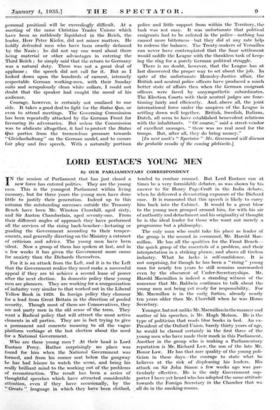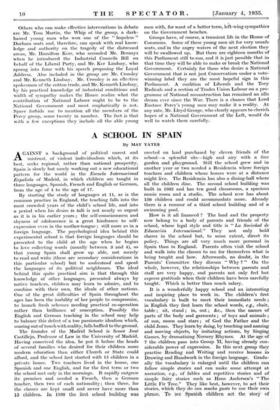LORD EUSTACE'S YOUNG MEN
By OUR PARLIAMENTARY CORRESPONDENT
IN the session of Parliament that has just closed a nevi force has entered politics. They are the young men. This is the youngest Parliament within living memory, but for three years the young men have done little to justify their generation. Indeed up to this autumn the outstanding successes outside the Treasury Bench have been Mr. Winston Churchill, aged sixty, and Sir Austen Chamberlain, aged seventy-one. From their different angles of approach they have performed all the services of the rising back-bencher—lecturing or goading the Government according to their temper- ' aments, and generally directing on the Ministry a cataract of criticism and advice. The young men have been 'silent: Now a group of them has spoken at last, and in a few weeks it has given the Government more cause for anxiety than the Diehards themselves.
For it is an attack from the Left, and it is to the Left that the Government realize they must make a successful appeal if they are to achieve a second lease of power after the next election. In domestic policy these young men are planners. They are working for a reorganization of industry very similar to that worked out in the Liberal Yellow Book in 1929. In foreign policy they clamour for a lead from Great Britain in the direction of pooled security. Though most of them are Conservatives, they are not party men in the old sense of the term. They want a Radical policy that will attract the most active elements in all parties. They are in fact trying to give a permanent and concrete meaning to all the vague platform verbiage at the last election about the need for a National Government.
• , Who are these young men ? At their head is Lord Eustace Percy. Rather surprisingly no place was found for him when the National Government was formed, and from his corner seat below the gangway he has had leisure to watch the scene, and bring his really brilliant mind to the working out of the problems of reconstruction. The result has been a series of thoughtful speeches which have attracted considerable attention, even if they have occasionally, by the ".Greats " language in which they have been clothed, tended to confuse counsel. But Lord Eustace can at times be a very formidable debater, as was shown by his answer to Sir Henry Page-Croft in the India debate, when he delivered a devastating exposure of the Diehard case. It is rumoured that this speech is likely to carry him back into the Cabinet. It would be a great blow to the young men grouped around him, for with his air of authority and detachment and his originality of thought he is the ideal leader for those who want not merely a programme but a philosophy.
The only man who could take his place as leader of the group is the second in command, Mr. Harold Mac- millan. He has all the qualities for the Front Bench— the quick grasp of the essentials of a problem, and their interpretation in a striking phrase, and above all tireless industry. What he lacks is self-confidence. It is not surprising, for though he has been a " rising " young man for nearly ten years he still remains unrewarded even by the obscurest of Under-Secretaryships. Mr. Harold Macmillan is indeed a standing witness of the nonsense that Mr. Baldwin continues to talk about the young men not being yet ready for responsibility. For Mr. Macmillan is in the early forties, already nearly ten years older than Mr. Churchill when he was Home Secretary.
Younger, but not unlike Mr. Macmillan in the manner and matter of his speeches, is Mr. Hugh Molson. He is the type of politician that reads blue .books in bed. An ex- President of the Oxford Union, barely thirty years of age, he would be classed certainly in the first three of the young men who have made their mark in this Parliament. Another in the group who is making a Parliamentary reputation is Mr. Richard Law, the son of the late Mr. Bonar Law. He has that rare quality of the young poli- tician in these days—the courage to state what he believes at the risk of displeasing his leaders. His attack on Sir John Simon a few weeks ago was par- ticularly effective. He is the only Government sup- . porter I have yet heard who has adopted the same attitude towards the Foreign Secretary in the Chamber that we all do in the smoking-rooms. Others who can make effective interventions in debate are Mr. Tom Martin, the Whip of the group, a dark- haired young man who won one of the " hopeless " Durham seats and, therefore, can speak with real know- ledge and authority on the tragedy of the distressed areas, Mr. Hamilton Kerr, who seconded Mr. Bernays when he introduced the Industrial Councils Bill on behalf of the Liberal Party, and Mr. Ker Lindsay, who sprang into fame with his speech proposing the Loyal Address. Also included in the group are Mr. Crossley and Mr. Kenneth Lindsay. Mr. Crossley, is an effective spokesman of the cotton trade, and Mr. Kenneth Lindsay, by his practical knowledge of industrial conditions and width of sympathy makes the House realize what the contribution of National Labour ought to be to the National Government and most emphatically is not. Space forbids me to mention all the members of the Percy group, some twenty in number. The fact is that with a few exceptions they include all the able young men with, for want of a better term, left-wing sympathies on the Government benches. • Groups have, of course, a transient life in the House of Commons. Some of these young men sit for very unsafe seats, and in the angry waters of the next election they will be swallowed up. But there are eighteen'months of this Parliament still to run, and it is just possible that in that time they will be able to make or break the National• Government. Certainly for those who desire a National. Government that is not just Conservatism under a vote- winning label they are the most hopeful sign in this Parliament. A coalition of Liberals and the Tory Radicals and a section of Trades Union Labour on a pro- gramme of National reconstruction has remained an idle dream ever since the War. There is a chance that Lord Eustace Percy's young men may make it a reality. At any rate, Mr. Lloyd George, who clearly appears to cherish hopes of a National Government of the Left, would do well to watch them carefully.







































 Previous page
Previous page